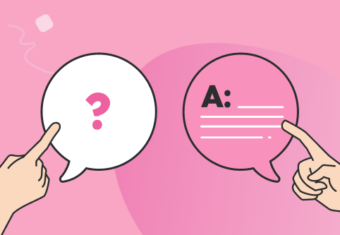When you’re interviewing for jobs while still employed, interviewers will naturally be curious about why you’re leaving your current position. But what they actually want to know isn’t as straightforward as some might think.
The following tips will help you navigate this tricky interview question and structure the kind of answer they’re looking for.
Why do interviewers ask “why are you leaving your current job?”
Whether you’re just looking for new opportunities or simply hate your job, interviewers want to understand the reasons behind your decision. They’re trying to find out if you’d be likely to leave a new role quickly, or if your values match the company’s.
To come off as proactive and professional, it’s a good idea to not only brush up on helpful interview tips but also learn how to present your answer in a way that doesn’t raise any red flags.
Good reasons for leaving a job
Reasons for leaving a job can vary widely. Here are some of the most common reasons to leave a job that won’t be a red flag for employers:
- To look for better career growth and development
- To learn new skills and gain new experience
- To seek better job security or stability
- You want a better work-life balance
- You’re interested in greater financial rewards or benefits
- You want more flexible working hours
- You need to relocate
- Your current company is restructuring, or your position was made redundant
- The company’s values no longer align with your own
- You want to go back to school and earn a degree
If you find yourself wanting to leave your job because of other reasons, like leaving a toxic workplace, for example, frame your answer in a positive light during the interview. Complaining to a hiring manager about your current job will only hurt your chances of getting a job offer.
If your main motivation for wanting to leave your current job is financial, it’s best not to mention this. Hiring managers want to know you’re driven by more than a salary and won’t be ready to leave at the first sign of higher compensation.
“Why do you want to leave your current job” sample answers
There are many reasons why you might want to leave your current job, but it’s important to choose a reason that is positive and reflects well on you. Explaining what you’re looking for in a new job also helps highlight why you’d be a good fit for the role you’re interviewing for.
When preparing your answer to why you want to leave your job, follow these tips:
- Keep your response brief (a minute or two)
- Avoid talking negatively about your current employer
- Demonstrate your interest and how you’ll be committed to the new role
Let’s look at three sample answers to help you navigate this interview question:
How to explain leaving a job for personal reasons
If you’re leaving your job for reasons you’re not comfortable sharing, like an overly demanding work environment or poor management, you can still be honest without scaring off interviews.
Here’s an example answer for a web developer candidate who’s looking for a better work-life balance without going deep into detail or mentioning any negative experience at their current job:
Sample answer for personal reasons
“I’m looking for an opportunity where I can leverage my skills and experience while also balancing my professional and personal life. I have an excellent track record in optimizing web layout and site responsiveness and always overperformed when fixing bugs and increasing customers’ time on the site.
As dedicated to education and self-learning as I am, I appreciate having more flexible hours to work on personal projects with the objective of developing my skills. I believe a healthy balance between work and learning allows me to give my best.”
How to explain leaving a job for a career change in an interview
If you’re leaving to transition into a new career because you’re passionate about a new industry or feel like you’re stuck in a career rut, here’s a great way to frame your answer to a potential employer:
Sample answer for career change
“Although I’ve gained a lot of experience in the private finance sector, I believe I can transfer my skills and experience to the non-profit sector. I’m seeking out opportunities that will allow me to give back to those less privileged and feel more fulfilled while still advancing in my career path.
I’m excited about this role specifically because it would allow me to make full use of my research and analytical skills and gain experience in creating better strategic program recommendations to help kids have access to higher education. I myself got where I am today thanks to several scholarships. ”
How to explain leaving a job with no growth opportunities
Whether you’ve learned all there was to learn at your current job or feel you’re stagnating professionally, here’s a sample answer about growth opportunities that’s honest and highlights what the candidate’s looking to gain in a new role:
Sample answer for lack of growth opportunities
“I’ve gained a lot of experience during my time at ABC Corp, and feel that I need to open myself to new challenges that’ll grow my career further. As my current employer doesn’t offer opportunities to do more of [X] and [Y] at this time, I believe it’s necessary to change jobs to continue challenging myself. I noticed these are core responsibilities for this role, so I was immediately interested in the position. I’d love to gain experience and develop expertise in these areas.”
In the event you already left your job and find yourself needing to answer “why did you leave your last job?” instead, it’s even more important to frame your answer in a way that reflects positively on you because you aren’t in a situation where you have the advantage of being employed.
How to answer “why are you leaving your current job”
Preparing your answer ahead of time will help you tackle this challenging interview question.
Here are three tips to follow to help you nail your response when asked why you want to leave your job:
1. Give a clear reason
You need to demonstrate that you’ve put a lot of thought into your decision to change jobs and that you’re excited about this new position.
To avoid confusion, tailor your answer to the job you’re interviewing for by specifically explaining what appeals to you about the opportunity over your current position.
It’s especially important to give a clear reason for leaving your job because prospective employers may contact your former employer to see if your reason for leaving checks out.
2. Stay positive
Don’t share negative information about your current employer or your workplace in general.
It’s important to be positive and always show gratitude for everything you’ve learned from your current role. Future employers want to know how you’ve grown as a professional in your current role and providing them concrete examples will help illustrate this. Remember to make it clear you’re looking forward to how this new role fits into your career path.
3. Keep your answer concise
It’s essential to keep your answer brief and simple so you can focus on how this new opportunity is a great fit for you.
Your response should be focused on how you’re looking forward, not on what you’re leaving behind. Being concise in your answer will make sure you don’t overshare.
What not to say when explaining why you’re looking to leave your current position
No matter your reasons for wanting to leave, it’s critical to present your answer to the question “why do you want to leave your current job?” in a positive and professional manner.
- Avoid citing money as your reason for leaving because it could easily be interpreted as a red flag by the interviewer. As a prospective job candidate, you should always find non-financial incentives that will drive you to give your best work.
- Avoid mentioning reasons that are unrelated to your work or career as your main motivator, like wanting a shorter commute. While it’s okay to leave your current job for personal reasons, you shouldn’t say they’re your primary reason.
- Avoid vague answers. An interviewer won’t be impressed if you use a vague answer like “it wasn’t the right fit”.
If you’re leaving your job to get a pay bump, the best way to frame this is by explaining that you’re looking to take on a more senior role. Hiring managers will understand you’re looking for a promotion and the raise that follows.
You don’t always have to delve into specifics, but you should be as open and honest as possible about why you’re seeking to leave your job. At the end of your answer, circle back to what attracted you to the job you’re interviewing for and what you’re looking forward to.
Additional interview resources
Here are additional resources to help you pass your interview:
- Answering “why are you suitable for this job?”
- Answering “tell me about yourself” in an interview
- How to answer “what do you like least about your job?” positively
- Answering “what motivates you?”
- Great sample answers to the question “what is your greatest achievement?”
- 15 interview tips to get hired
- Answering “where do you see yourself in 5 years?” correctly
- 4 examples to help you answer “why do you want to work here?”
- Great sample answers to the interview question “why should we hire you?”
- How to answer “walk me through your resume” correctly
- How to ask for feedback after an interview
Click to rate this article
4.9 Average rating
















